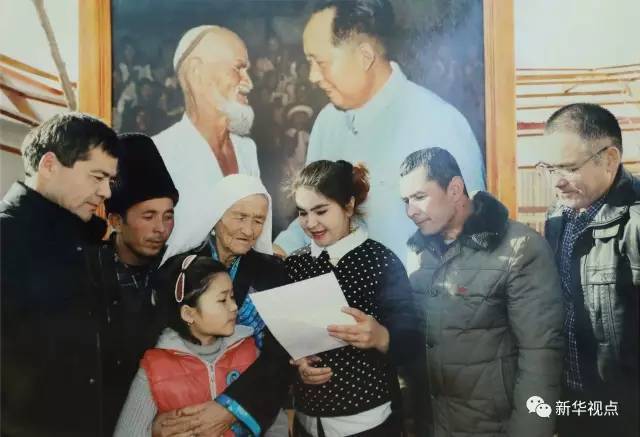Xi Focus-Closeup: Photos tell a Uygur family's enduring love for country


BEIJING -- During the annual national legislative session in 2017, tightly-scheduled President Xi Jinping took his time looking over photos of a Uygur family from Northwest China's Xinjiang Uygur autonomous region.
The photographs had been brought to Xi by a national lawmaker, who was entrusted by the family of Kurban Tulum, a farmer from Xinjiang. They also asked the lawmaker to bring their best wishes for Xi and convey their determination of upholding ethnic solidarity.
While looking over the photos, Xi also asked about the family's work and life, and expressed his care for the family's fellow villagers, enquiring how much farmland each household has and what they grow in the field.
Kurban Tulum died in 1975, but his story lives on.
Born in 1883 into a poor farmer's family, Kurban Tulum lived in misery for decades suffering from the exploitation of local feudal landlords. In 1949, his life was transformed following the peaceful liberation of Xinjiang -- the Uygur man, then in his 60s, lived a happy life thereafter, with his own home and farmland, surrounded by family.
In order to express gratitude for the peaceful liberation of Xinjiang in 1949, Kurban Tulum wished to ride a donkey from Xinjiang to Beijing to visit Chairman Mao Zedong in the 1950s.
The autumn of 1955 was a harvest season. Kurban Tulum prepared gifts for Chairman Mao -- the best harvests from his own-tilled land -- got on his donkey, wearing festive attire and carrying over 50 kg of staple for his own ration, and headed for Beijing. While his first attempt at this bold adventure was stopped by local residents and officials, he finally realized his dream in 1958 when he was received by Chairman Mao. A year later, he joined the Communist Party of China.
Kurban Tulum passed on his love for the Party and the country to his offspring. In late 2016, his great-granddaughter Rukyam Metseydi wrote a letter to Xi, expressing her family's gratitude for the care of the Party and government and their love for the nation and Xinjiang.
Xi soon replied. In his letter addressed to Tohtihan Kurban, Kurban Tulum's daughter, Xi said, "I am glad to learn that you are still in good health when you are nearly 90 years old, and your family, with over 100 members, live a happy life." He also told the family that he had first heard about Kurban Tulum's story when he was a child, and it had stayed with him through the years.
Xi once said that the national rejuvenation can be only achieved when all ethnic groups remain closely united like the seeds of a pomegranate that stick together. "Not a single ethnic group should be left behind in the efforts to fully build a modern socialist China," he said.
With the last 3.06 million people shaking off poverty over five years, Xinjiang, home to over 25 million people of various ethnic groups, bid farewell to absolute poverty in 2020.
Thousands of miles away from Beijing, when watching Xi's talk with Xinjiang lawmakers on TV, Tohtihan Kurban took out Xi's reply letter again. "I'd like to tell the story of ethnic solidarity to more people and pass on the tradition of loving the Party and the country to generation after generation," she said.




































